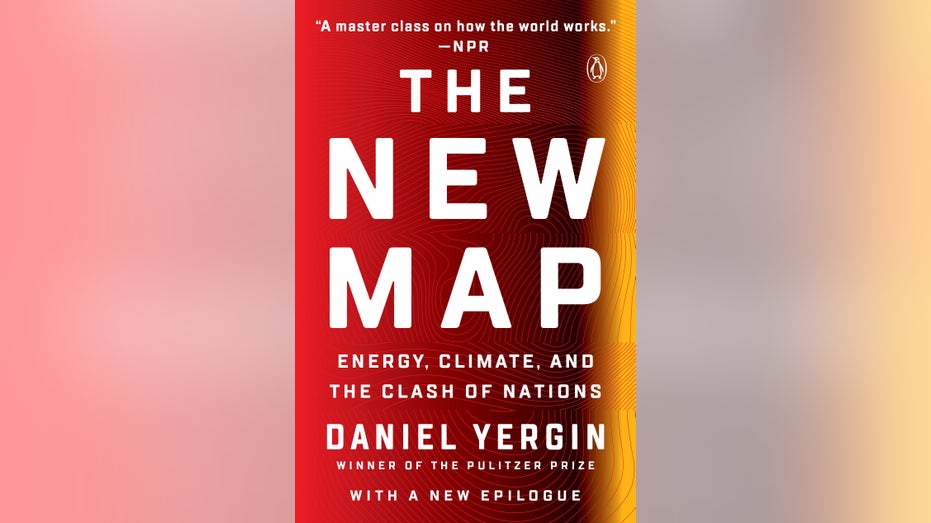Daniel Yergin spelled out the importance of the U.S. shale revolution — before Russia's attack on Ukraine
The energy expert and celebrated author says nations are adjusting their policies following Russia's invasion of Ukraine
Daniel Yergin: We have to regard this as a geopolitical strategic asset
IHS Markit vice chairman Daniel Yergin gives his take on increasing U.S. energy production on 'Kudlow.'
Russia's invasion of Ukraine has already brought changes to the global geopolitical landscape, with none more apparent than the shifts countries are making in regard to energy policy.
Daniel Yergin, a Pulitzer Prize-winning author and vice chairman of S&P Global, lays out what led the world to this point in his latest book, "The New Map: Energy, Climate and the Clash of Nations," wherein he explains the importance of shale for the U.S. economy and beyond.

Cover of "The New Map: Energy, Climate, and the Clash of Nations" by Daniel Yergin (Penguin Random House)
Yergin published "The New Map" in 2020 and added an epilogue last year. Now, it appears to be a prophetic work that spelled out the warning signs of Vladimir Putin hitting a boiling point – and the importance of America's shale revolution for not only U.S. national security, but for our European allies.
JAMIE DIMON CALLS FOR DEVELOPMENT OF DOMESTIC GAS AND ENERGY RESOURCES: A NEW ‘MARSHALL PLAN’
"The effects of the shale revolution on the trade position of the United States are striking," he writes. "Using 2007 as the baseline comparison, the U.S. trade deficit in 2019 was $309 billion lower than it would have been if there had been no shale revolution. Without shale, the United States would have continued to be the world’s largest oil importer. It also would have become a large importer of [liquid natural gas], competing for supplies with China, Japan, and other countries, adding greatly to the trade deficit."
But U.S. shale production also became a clear threat to Putin.
Yergin recalled to FOX Business that Putin "erupted" at him when he asked Putin about shale during the St. Petersburg International Economic Forum in 2013, and pointed to the story in his book.

Vice Chairman of IHS Markit Daniel Yergin attends the 2018 Columbia Global Energy Summit. (Atilgan Ozdil/Anadolu Agency/Getty Images / Getty Images)
"The questioner happened to mention shale gas," Yergin wrote, referring to himself. "At that, the Russian president erupted. He launched a broadside, warning against possible shale gas development in Eastern Europe, denouncing shale gas as a grave danger, an environmental threat, a despoiler of land and water."
"Putin reacted so vehemently because shale gas was also becoming a matter of geopolitics," Yergin goes on to explain. "For shale was a challenge for Russia, at the time the world’s largest producer of natural gas, as well as the major supplier to Europe."
OIL AND GAS EXECS RIP BIDEN FOR TREATING INDUSTRY LIKE AN ‘ENEMY’
Without U.S. shale, not only would the U.S. be in a tough spot today, but European allies would be in a worse fix.
"The rise of shale has been one of the keys to diversifying the European gas market and enhancing energy security," Yergin wrote. "As Europe’s top supplier of gas, Russia had, in the minds of some in the European Union and many in Washington, the ability to use gas supply as leverage for political objectives."

Daniel Yergin, vice chairman of S&P Global, speaks during the 2022 CERAWeek by S&P Global conference in Houston, Texas, on Monday, March 7, 2022. ( Aaron M. Sprecher/Bloomberg via Getty Images / Getty Images)
"Enter U.S. shale gas. First it eliminated the need for LNG in the United States, leading exporters to redirect some of their LNG to Europe," Yergin wrote. "Then the export of LNG from the United States reinforced the shift toward competition in Europe—with U.S. gas, along with other LNG supplies, competing head-to-head with Russian gas."
GET FOX BUSINESS ON THE GO BY CLICKING HERE
Yergin says that having energy independence, as the U.S. has achieved in large part thanks to shale, is critical for national security and that America must follow energy policies that will ease prices in the short term.
"The government and energy firms need to do what we've done ever since World War II in a crisis, and work together," he told FOX Business. "This is an emergency."





















